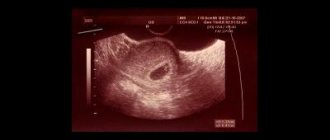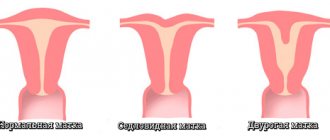Implantation of the fertilized egg is the very beginning of the pregnancy period. It is practically not noticeable by the expectant mother, but, nevertheless, it is incredibly important for the development of the child. Its importance is confirmed by the fact that if the fertilized egg is not implanted, the child simply will not turn out.
In this article we will look at the symptoms of implantation of the fertilized egg, its timing and the sensations that a woman may experience. Many scientists argue that for the first time a woman feels something after implantation, however, discharge during implantation of the fertilized egg can say a lot.
How does the implantation process occur?
The embryo transfer procedure during IVF is painless, lasts on average 5 minutes, and does not require anesthesia. The endometrium of the uterus must be completely ready for embryo transfer for implantation to be successful. For this purpose, the woman is provided with hormonal support before and after embryo transfer.
The endometriotic layer of the uterus changes depending on the phase of the menstrual cycle. Its receptivity and readiness for embryo attachment is called the “implantation window” and lasts only 2-3 days - approximately 5-7 days after ovulation. By this time, the endometrium should become thicker (at least 7 mm) and filled with new blood vessels. If implantation is successful, the endometrium will provide nutrition to the embryo during the first period of gestation.
The embryo comes into contact with the endometrium through the outer layer of trophoblast. Trophoblast cells “cling” to the epithelium, penetrating deeper and deeper. At the site where the embryo is attached, a defect is formed in the endometrium, which is closed with a clot of fibrinogen (protein) after complete implantation occurs - after about 12 days. The defect disappears, and the embryo, completely immersed in the endometrium, forms a bulging tissue at the site of attachment.
Thickness of the endometrium of the uterus
Insufficient thickness of the endometrium of the uterus is a fairly serious and significant reason for the failure of in vitro fertilization.
Thin, immature endometrium is not able to provide the embryo after implantation with sufficient nutrients necessary for its development. In addition, it does not perform a sufficient secretory function. This factor also affects the further course of pregnancy.
Factors that influence embryo maturation:
- uterine hypoplasia and associated hormonal imbalances;
- previous injuries, inflammatory processes that impair blood circulation in the uterus;
- traumatization of the endometrium, which arose due to frequent curettage and abortions.
A preliminary assessment of the condition of the uterus and the degree of its maturity is possible only after an ultrasound examination, during which the thickness of the walls of the uterus, their condition, the presence of defects and developmental disorders are determined.
Timing of implantation of the fertilized egg
When sex gametes are combined in vitro during IVF, a cell containing a chromosome set (diploid) is formed. The cell begins to divide, forming a blastomere (6–8 cells), then a morula appears (16–64 cells), then a blastocyst, which is implanted into the uterus.
Implantation of embryos occurs in one of three periods, which differ from each other in days after fertilization:
- Early - on the 6th day.
- Medium - on days 7–8, five-day implantation is carried out during IVF, which ends in success in 90% of cases.
- Late - on the 10th day.
The average time for implantation of embryos into the endometrium is 7–8 days after fertilization.
Implantation of the embryo into the uterine wall
After the sperm penetrates the wall of the egg, it is covered with a specific membrane that is impenetrable to other sperm.
From the moment of fertilization, the fertilized egg begins to divide intensively, forming a larger number of cells. It moves towards the uterus through contraction of the fallopian tubes, on the walls of which villi are located. The fertilized egg, having reached the uterine epithelium, sheds its membrane, exposing the trophoblast. In turn, the trophoblast helps secure the fertilized egg in the uterine wall and participates in the formation of the placenta. Embryo implantation may not occur due to the membrane being too dense. As a rule, only a blastocyst without genetic abnormalities can gain a foothold in the uterine lining. In this case we can talk about natural selection. At this stage, an embryo with serious pathological abnormalities is rejected by the woman’s body and the pregnancy is terminated.
The reasons for a failed pregnancy can be both violations on the part of the blastocyst cells and on the part of the female body:
- too dense protective membrane of the fertilized egg
- pathological genetic disorders of blastocyst development
- low level of progesterone in a woman’s body. Normal levels of the hormone are necessary for the consolidation and subsequent development of the fertilized egg.
- Inconsistency in the thickness of the uterine epithelium. It should vary between 10-13 mm
- Deficiency of nutrients in the uterine tissues
After the embryo is firmly implanted, the level of human chorionic gonadotropin in the woman’s body increases significantly and early signs of pregnancy appear.
When the fertilized egg attaches later
During IVF, blastomeres are cultivated for 3–5 days, after which the highest quality embryo is transplanted into the uterus. The entire process from fertilization, cultivation, embryo selection to replantation takes 5–8 days. Therefore, late implantation is more typical for IVF . In addition, with artificial insemination, the embryo needs more time to adapt. For successful late embryo implantation
Sufficient production of progesterone by the female body is necessary. The success of the embryo transfer process can be judged by the increase in hCG produced by chorionic tissue one day after successful attachment. An ultrasound visualizes a small (2 mm) fertilized egg.
Late embryo implantation is no different from early or middle implantation in terms of possible negative impact on the course of pregnancy, on the development and health of the fetus.
To avoid rejection during late implantation, a woman is recommended to:
- avoid intimacy at first;
- do not take baths, do not visit saunas, steam baths, avoid any thermal procedures, including exposure to the sun (if the procedure takes place in the summer);
- do not lift heavy objects;
- do not engage in sports or active activities;
- do not overcool;
- avoid psycho-emotional overloads, to which sex and gonadotropic hormones that support pregnancy are highly sensitive.
(For more information about what to do after embryo transfer, read this material - note altravita-ivf.ru).
Implantation during cryotransfer
In embryological practice, two methods of implanting embryos into the uterine cavity are used:
- Instant transfer - implantation of diploid cells into the uterus immediately after their cultivation in a nutrient medium;
- Cryotransfer is the transfer of embryos thawed immediately before IVF into the uterine cavity.
Cryotransfer is possible if the couple has previously used assisted reproductive technologies to conceive. To avoid repeated stimulation of ovulation if IVF is unsuccessful, it is recommended to freeze part of the fertilized eggs for subsequent attempts.
Conception on the 5th day after cryotransfer occurs infrequently, which is due to the need for embryos to go through an adaptation period when entering the female body. If a blastocyst is implanted into the endometrium, patients may experience objective changes in their health status.
Signs
When resorting to IVF, every woman expects that the attempt will be successful and she will become pregnant. During the implantation process, many patients listen too much to their well-being, and those who are especially sensitive may exaggerate their sensations. Of course, this does not mean that symptoms are completely absent; some people really don’t have them, while others have them to varying degrees. Women describe their feelings during late implantation
subjective, but you need to try to evaluate the change in your well-being objectively. This is important for the doctor for further actions in case of failure, in order to draw the right conclusions, as well as in case of a favorable outcome, in order to competently manage the pregnancy.
Symptoms of late embryo implantation:
- Bleeding when the embryo penetrates the uterine layer, when small endometrial vessels rupture. With minor bleeding, a woman may decide that she has started menstruation, and implantation has failed. An hCG test will help you draw the right conclusions in the absence of heavy bleeding.
- A common sign of late implantation is nagging pain around the lower back and lower abdomen. They can be intense or weak.
- Low-grade fever may persist throughout the first trimester.
- Nausea.
- Weakness, fatigue, dizziness, drowsiness.
- Taste of metal in the mouth.
- Psychological instability, from depressive states to strong emotional upsurges.
If the discharge is significant, continues for a long time, and the temperature rises above 38 degrees, severe pain in the abdomen is noted, this should be reported to the doctor immediately. Heavy bleeding should be especially alarming. Symptoms are not typical for late implantation; each woman may have some other manifestations. Also, the absence of symptoms does not mean that pregnancy has not occurred; an hCG test will allow you to assess the situation. The doctor will explain what the patient may experience during implantation, whether it happened on time or later, so you need to be prepared for any development of events, but set yourself up only for a positive result. Anxiety can negatively affect the outcome of the procedure.
How does this procedure feel?
Many patients participating in the IVF program ask doctors: “Is it possible to feel the implantation of an embryo?”, “What sensations should appear during embryo implantation?” Since this process lasts about 3 days, during this time some symptoms may appear:
- Brown discharge during implantation is normal. Discharge during embryo implantation is extremely scarce. If there are other discharges during implantation, especially prolonged and bloody ones, you should contact your doctor as an emergency.
- The pain during implantation is nagging in nature. The vast majority of women experience pain during embryo implantation. They can have a strong character or be unobtrusive. As a rule, the pain is localized at the site of attachment of the fertilized egg.
- Mild nausea.
- Metallic taste in the mouth.
- The temperature may be elevated to low-grade levels.
- Emotional lability and irritability.
Signs of embryo implantation in the uterus are quite varied and can manifest themselves individually in each woman.
Signs of implantation correspond to early signs of pregnancy.
Signs of embryo implantation after IVF are not observed in the vast majority of cases.
Answering the question “can you feel the implantation of an embryo?” you can answer in the affirmative, with the exception of late implantation as part of an in vitro fertilization program.
Reasons for non-attachment of the fertilized egg
Each patient has an individual response to IVF procedures, so late implantation may not take place.
The most common reasons for rejection:
- embryo with genetic abnormalities;
- poor quality material;
- unhealthy endometrium;
- exacerbation of chronic pathologies of a woman during an IVF program;
- the patient's age is 35 years or more;
- unexpected disorders of the reproductive system.
If late implantation fails, an examination is carried out, the doctor analyzes the situation, draws conclusions about the reasons for the failure, draws up a diagnostic and IVF program taking into account the information received.
Read more about cryotransfer after unsuccessful IVF in this material - note. altravita-ivf.ru.
What will increase the likelihood of successful implantation
In order for the embryo to securely attach to the endometrium and continue to develop further, a number of recommendations should be followed:
- Sexual rest
It is recommended to refrain from sexual intercourse during the expected days of implantation and in the first week after it after the IVF procedure. The uterine contractions that occur during orgasm can disrupt the process of implantation of the embryo into the endometrium or cause early miscarriage after implantation.
- Limiting physical activity
Avoid heavy lifting for 7–10 days after ovulation in case of natural conception and in the first 8–10 days after embryo transfer for IVF.
- Consuming enough protein
It is recommended to slightly change the diet towards increasing the consumption of protein foods (meat, fish, poultry, cottage cheese, eggs, cheese) in the first 10 days after ovulation. Protein is necessary to prepare the endometrium to receive the embryo.
- Treatment of gynecological diseases
Preparations for implantation should begin at the stage of pregnancy planning. It is important to treat inflammatory processes in the uterus and appendages, correct hormonal imbalances, undergo examination for hidden sexually transmitted infections and the necessary treatment if they are detected.
- Treatment of somatic pathology
It should also be carried out at the stage of pregnancy planning. Chronic bronchopulmonary diseases and pathology of the digestive tract pose a danger to the successful attachment of the fertilized egg and the further development of pregnancy. Coughing and constipation significantly increase intra-abdominal pressure, which can disrupt the implantation process or cause early miscarriage.
Results of in vitro fertilization
Has the embryo been implanted
, checked by analyzing human chorionic gonadotropin - hCG. Testing is carried out approximately 2 weeks after the transfer. It is not advisable to do an analysis earlier, since hCG has not yet risen to a level where it can be accurately determined, so as not to make a mistake with the onset or non-occurrence of pregnancy.
| Embryo age | Day after transfer of a 3-day-old embryo | Day after transfer of a 5-day embryo | Minimum hCG value, honey/ml | Average hCG value, honey/ml | Maximum hCG value, honey/ml |
| 7 | 4 | 2 | 2 | 5 | 10 |
| 8 | 5 | 3 | 3 | 7 | 17 |
| 9 | 6 | 4 | 3 | 10 | 18 |
| 10 | 7 | 5 | 8 | 17 | 25 |
| 11 | 8 | 6 | 11 | 26 | 46 |
| 12 | 9 | 7 | 17 | 47 | 68 |
| 13 | 10 | 8 | 20 | 75 | 105 |
| 14 | 11 | 9 | 30 | 105 | 171 |
| 15 | 12 | 10 | 38 | 160 | 280 |
| 16 | 13 | 11 | 70 | 260 | 400 |
| 17 | 14 | 12 | 120 | 400 | 580 |
| 18 | 15 | 13 | 210 | 660 | 850 |
| 19 | 16 | 14 | 380 | 970 | 1300 |
| 20 | 17 | 15 | 510 | 1370 | 2000 |
Even after 2 weeks, some women may still have low hCG in their urine, so the test will show a negative result. At this time, you should not stop taking prescribed hormonal medications and other medications. A more accurate result will be obtained by laboratory testing of blood serum for hCG using the enzyme immunoassay method. Venous blood is taken on an empty stomach in the morning. The evening before, they have dinner no later than 19:00. You can conduct a rapid test for hCG, the results of which will be available in 1.5–2 hours. A typical hCG test will take 1-2 days. Gestation after IVF is confirmed using ultrasonography performed 3 weeks after embryo transfer, when the fertilized egg and its location are clearly visible. If late implantation does not take place and menstruation begins, then hCG is also tested after 1–2 days.
Medication support
If there is a hormonal imbalance in a woman’s body, maintenance therapy is carried out. Its goal is to prepare the body for implantation of embryos, and subsequently for bearing a healthy child. The following drugs are used for this:
- Estrogen-containing. Most often, Proginov is prescribed. The active ingredient of the drug is estradiol valeriat. Used for insufficient estrogen production. These hormones take part in preparing the endometrium for the implantation of embryos. There are recommendations according to which Proginov continues until the 10th week of pregnancy. This is only relevant for pregnancy after IVF. Premature termination of pregnancy is prevented in this way.
- Progesterone containing. Progesterone is involved in preparing a woman’s body to accept an embryo. Therefore, in case of its deficiency, the prescription of drugs that compensate for hormonal deficiency is indicated.
The first signs of pregnancy in the early stages
The first signs of pregnancy are not always so noticeable that they attract the attention of women and are not always so eloquent as to specifically indicate an “interesting situation.” The feeling of weakness is sometimes attributed to overwork, frequent trips to the toilet are attributed to cystitis or hypothermia, nausea is attributed to food poisoning, and swelling is attributed to excess fluid drunk the day before. This happens even when a child is planned, not to mention cases of unplanned pregnancy, especially when it is the first! Meanwhile, understanding that the discomfort a woman experiences is nothing more than signs of pregnancy is very important: the sooner the expectant mother understands this, the sooner she will make the necessary changes in her lifestyle, everyday life, and professional activities, the sooner will think about taking additional vitamins (for example, Minisan Multivitamin Mom), and start eating right. So how do you understand that pregnancy has occurred?
First signs of pregnancy: when to expect them?
Pregnancy begins its countdown from the moment a sperm meets an egg and fertilizes it. Moreover, during the first few days (up to a week), the fertilized egg, although it has already turned into a blastocyst (a cluster of cells that will soon become an embryo), is in no way connected with the mother’s body. It, depending on where conception occurred, is located either in the funnel of the fallopian tube, or in the tube itself, or in the lumen of the uterine cavity; cell division occurs due to the nutrients present in the egg itself.
Until the moment of implantation, the growth of the embryo to the wall of the uterus, a woman cannot feel any signs of this position by definition: the first signs of pregnancy appear only after the moment of implantation. But some women still report discomfort they experience in the first days after possible conception. These sensations are purely subjective, have a rather psychological basis and more often occur in those women who passionately dream of motherhood. Or, on the contrary, they are afraid of getting pregnant (for example, after unprotected sexual intercourse).
After the moment of implantation (approximately 6-7 days after sexual intercourse, which resulted in conception), the first signs of pregnancy become noticeable before the delay in monthly bleeding - and you can and should pay attention to them. By the way, it is convenient to navigate the main periods of pregnancy using the Calendar.
Physiological changes in the first weeks
From the moment the embryo is implanted into the wall of the uterus, natural physiological changes begin that occur in the mother’s body, which are felt as signs of pregnancy in the early stages. Among them, the first is a small, spotting, brownish or bloody discharge. The reason for their appearance is damage to the mucous lining of the uterus during implantation. Such discharge is much less intense than menstrual bleeding, and its duration is also short - usually several hours; extremely rarely, implantation bleeding occurs for 2-3 days. Many women do not experience implantation bleeding at all.
Other signs of pregnancy are hormonal. At the moment of implantation, human chorionic gonadotropin (or hCG) begins to penetrate into the mother’s blood, a hormone produced by the tissues of the embryo, the purpose of which is to maintain and develop pregnancy. It is hCG that promotes the degeneration of the corpus luteum (temporary gland that produces progesterone) remaining after the release of the egg from the ovarian tissue into the corpus luteum of pregnancy. Compared to the “regular” corpus luteum, this gland lives longer (up to 12-14 weeks versus 2 if pregnancy does not occur) and produces progesterone much more intensely.
Subjective sensations in the first weeks
After the embryo has attached to the uterus, the signs and sensations of pregnancy already have a certain basis, but still remain to some extent subjective; you can focus on them, but you cannot definitely identify pregnancy using them.
Early signs of a possible pregnancy are as follows:
- general malaise of a woman. Expectant mothers often describe it as a “beginning ARVI”, which then does not develop into ARVI. Weakness, aches, lethargy, absent-mindedness and fatigue - but without symptoms of a respiratory infection as such;
- emotional instability: mood swings, tearfulness, irritability - many women are bothered by the same manifestations associated with the action of progesterone during the premenstrual period;
- sleep disorders: drowsiness, insomnia or sleep inversion (drowsiness during the day and lack of desire to sleep at night). After a long sleep, a feeling of exhaustion, as if there was no sleep at all;
- increased or, conversely, decreased sexual desire;
- heaviness in the lower abdomen;
- pain in the lower back, lower abdomen, groin and iliac areas - aching, shooting low-intensity pain, tingling, discomfort;
- swelling of the legs, lower abdomen - these phenomena are also associated with high levels of progesterone;
- headache;
- engorgement and tenderness of the mammary glands. The pain, especially during the first pregnancy, can be quite severe - for example, it appears while changing clothes, even if you do not touch the breast. Such sensations are associated with the restructuring of the mammary glands, preparing them for lactation, which begins immediately after conception;
- rise in body temperature (0.5-1º), subjective sensations of heat or chills;
- changes in taste and increased appetite are perhaps the most popular “folk” signs. Moreover, it is generally accepted that the expectant mother must certainly be drawn to salty foods or some inedible foods (chalk, resin, sand). In fact, we are talking specifically about a change in taste, for example, a woman who did not like sweets before her pregnancy may want cake or chocolate, and not pickles, which have long become a common stereotype in conversations about pregnancy. However, reviews from women often indicate that based on the nutritional needs of the expectant mother, even the signs of a boy or girl during pregnancy can be determined - it is believed that cravings for sweets and milk indicate pregnancy with a girl, and the desire to eat meat and spicy dishes indicates that that the woman is expecting a son. There is no scientific basis for these observations;
- Nausea is one of the most common early signs. The timing of its appearance varies from person to person - some people are bothered by it literally from the first days, others - much later. The intensity of nausea also varies: someone feels sick at the thought of food or certain foods, and when trying to eat, vomiting begins; someone feels nausea more like moderate discomfort in the first half of the day, which goes away on its own;
- aversion to smells, even familiar and beloved ones;
- frequent urge to urinate - probably of a reflex nature and associated with a rush of blood to the bladder and irritation of the uterine wall due to implantation of the embryo;
- stool disorders - can be associated with changes in diet (for example, refusal of certain foods due to nausea), or have a reflex nature.
Pregnancy tests: household and laboratory
The first relatively reliable symptom of pregnancy is a delay in the next monthly bleeding. However, even this sign may not indicate expected motherhood, but may be the result of an illness, hormonal imbalance or severe stress. Therefore, it is important to confirm the first signs of pregnancy with a test, and then a visit to the doctor and an ultrasound examination.
The main part of household pregnancy tests are test systems that determine the level of hCG in a woman’s urine. They differ in their appearance, structure, and degree of sensitivity. More expensive, high-tech and sensitive tests allow you to get an answer literally on the first day of the delay, less sensitive ones give reliable results no earlier than 5-7 days.
Laboratory methods for determining pregnancy are much more sensitive and are based on determining the level of hCG already in the woman’s blood. Moreover, such an analysis can give a reliable result even before the onset of a missed period, since hCG appears in a woman’s blood from the moment of implantation of the embryo. At the same time, you need to remember: household or laboratory tests only indicate the presence of pregnancy as such. Where implantation occurred - in the uterine cavity or fallopian tube, how the embryo develops, whether a single or multiple pregnancy has occurred can only be answered after an ultrasound examination performed by a doctor. Therefore, when you see two coveted lines on the test, you need to quickly contact a gynecologist and undergo a full examination.
Nutrition during pregnancy
From the very first signs of pregnancy, even if these are suspicions rather than objective signs, it is recommended to change your diet. Give up fast food and “junk” food, processed foods and canned food, and reconsider your diet as a whole. The expectant mother should eat high-quality foods, as varied as possible, the diet should be nutritious but in moderation - the popular stereotype that a pregnant woman should “eat for two” leads to excess weight and health problems for both mother and baby. At the same time, you need to remember: even the highest quality and carefully selected diet can be poor in vitamins and microelements. Unfortunately, these are the costs of modern food production and storage technologies. In such cases, additional intake of a vitamin complex suitable for pregnant women can help compensate for the lack of both vitamins and minerals in the body. For example, the Finnish complex “Minisan Multivitamin Mom” was developed specifically for pregnant and lactating women and contains 17 vitamins and minerals. You can read more about nutrition during pregnancy in the article.
Advice for an expectant mother In conclusion, I would like to give some advice to our expectant mothers. The discomfort of the first days of an interesting situation is not just a whim of nature, which “wanted” to torment a woman. All these signs have their reasons, they are all aimed at informing the mother that a new life has arisen in her, and this life needs special protection and attention. For example, the same nausea and aversion to smells partly play a protective role; fatigue and drowsiness signal that the body needs additional rest in the first, difficult days of pregnancy. You should treat your feelings during this period with attention.
At the first suspicion of possible imminent motherhood, give up alcohol and smoking (including passive smoking). If you need to take medications and special vitamins, consult your doctor and choose the best quality products that will be beneficial to the fetus if pregnancy does occur.
Walk more in the fresh air, don’t get tired if possible, and tune in to the magical nine months ahead that will end with the birth of your continuation. Let this period be wonderful!
Literature:
- WOMAN’S BODY DURING PREGNANCY: EXTRAGENITAL CHANGES (LITERATURE REVIEW) / N.A. Barbarash, O.L. Barbarash, S.V. Kalentyeva // Bulletin of the SB RAMS, -2005, No. 2, p. 107-111
- G.M. Savelyeva, V.I. Kulakov. Obstetrics. - Moscow: Medicine, 2000. - P. 816. - ISBN 5-225-04549-9.
- Modern problems of nutrition for pregnant and lactating women / L.G. Mamonova // - Issues of modern pediatrics, - 2006, No. 4, p. 104-106 https://cyberleninka.ru/article/v/sovremennye-problemy-pitaniya-beremennyh-i-kormyaschih-zhenschin
Facebook
Linkedin
VK








